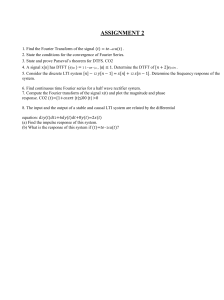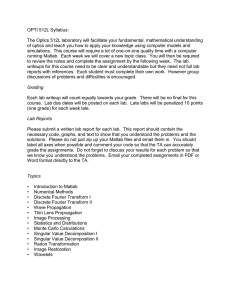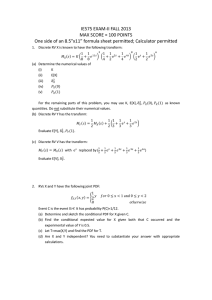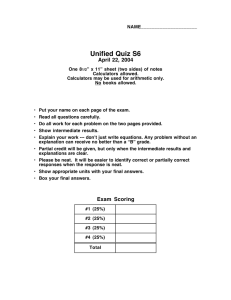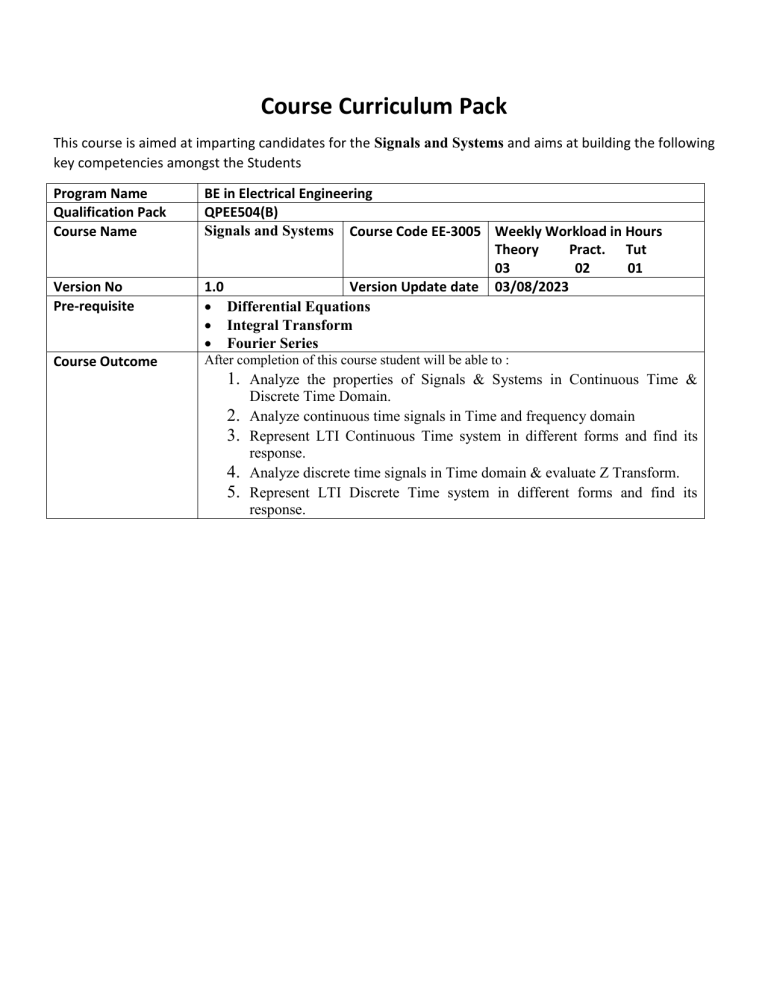
Course Curriculum Pack This course is aimed at imparting candidates for the Signals and Systems and aims at building the following key competencies amongst the Students Program Name Qualification Pack Course Name Version No Pre-requisite Course Outcome BE in Electrical Engineering QPEE504(B) Signals and Systems Course Code EE-3005 Weekly Workload in Hours Theory Pract. Tut 03 02 01 1.0 Version Update date 03/08/2023 Differential Equations Integral Transform Fourier Series After completion of this course student will be able to : 1. Analyze the properties of Signals & Systems in Continuous Time & 2. 3. 4. 5. Discrete Time Domain. Analyze continuous time signals in Time and frequency domain Represent LTI Continuous Time system in different forms and find its response. Analyze discrete time signals in Time domain & evaluate Z Transform. Represent LTI Discrete Time system in different forms and find its response. The Course Encompasses Sr. No Units Key Learning Outcomes 1 Classification of signals and systems Theory Duration (hh.mm): (14.00) The l Students should be able to: LO1 : represent & classify signals & Systems. LO2: identify LTI systems. Practical Duration (hh.mm): (04:00) 2 3 4 5 Analysis of continuous time signals Theory Duration (hh.mm): 12:00 Practical Duration (hh.mm): (8:00) The Students should be able to: LO3 : derive Fourier series for Linear time invariant continuous time systems Theory Duration (hh.mm): 7:00 Practical Duration (hh.mm): 02:00 The Students should be able to: LO5: Realize the LTI Continuous Analysis of discrete time signals The Students should be able to: LO6: Evaluate Z Transform & DT Theory Duration (hh.mm): 10:00 Practical Duration (hh.mm): 02:00 Linear time invariant discrete time systems Theory Duration (hh.mm): 7:00 Practical Duration (hh.mm): 04:00 continuous time signals. L04 : List and apply properties of Integral Transform. Time systems in Differential, State Space Form. Fourier Transform for DT Signals. The Students should be able to: LO7: Realize the LTI Disctrete Time systems in Differential, State Space Form. Instructional Objectives Unit wise Syllabus Details Sr. No 1 Units Classification of signals and systems Theory Duration (hh.mm): (14.00) 2 Analysis of continuous time signals Theory Duration (hh.mm): 12:00 3 Linear time invariant continuous time systems Theory Duration (hh.mm): 07:00 4 5 Analysis of discrete time signals Detailed Topic wise Syllabus References Classification of Signals. Step, ramp, pulse, T1,T2 Theory Duration (hh.mm): 10:00 Linear time invariant discrete time systems Theory Duration (hh.mm): 07:00 impulse, sinusoidal and exponential signals. Basic operations on signals (Addition, Multiplication, Time, Amplitude Scaling System Definition & classification. Basic properties of systems – Causality, Linearity & Stability. Fourier series and spectrum of CT Signals. Even and Odd Symmetry Laplace Transform of Basic Signals. Properties of ROC Wavelet transform. Representation of CT LTI Systems Differential equations representation Block Diagram representation state variable representation Response of LTI systems impulse response step response frequency response Analog filters Convolution sum and properties. Z transform and properties Properties of ROC inverse Z transform DTFT and properties Sampling of CT signals and aliasing Representation of DT LTI Systems Differential equations representation Block Diagram representation state variable representation Difference equations Impulse response Analysis of DT LTI systems using DTFT and Z transform. Digital filters. T1,T2 T1,T2 T1,T2 T1,T2 Text Books/Reference Books Sr. No Title of the Book Author Edition / volume Text(T) Reference (R) 2nd Edition T2 3rd Edition T1 1. Signals and Systems 2. Signals and Systems Alan V. Oppenheim, Alan S. Willsky, S Hamid Nawab A. Anand Kumar 3. Signals and Systems A. Nagoor Kani 2016 R1 4. Signals and Systems Mahmood Nahvi 2015 Indian Edition R2 5. Signals and Systems Simon Haykins R3 Equipment Code -- List of Unique Equipment required Sr. No Units Description of Equipment 1 Classification of signals and systems Analysis of continuous time signals Study 2 3 Linear time invariant continuous time systems 4 Analysis of discrete time signals 5 Linear time invariant discrete time systems MATLAB, Simulink Scilab MATLAB, Simulink Scilab MATLAB, Simulink Scilab MATLAB, Simulink Scilab M1 S1 M1 S1 M1 S1 M1 S1 Assessment Matrix LO5 LO6 LO7 Other (Real World Application/Field Trip) Prototype making Role Play Group Discussions LO4 Case Study analysis Research assignments Presentation Seminar Project 5 LO1 LO2 LO3 Tutorial 4 Lab Experiment 3 Practical Experiment 2 Classification of signals and systems Analysis of continuous time signals Linear time invariant continuous time systems Analysis of discrete time signals Linear time invariant discrete time systems Learni ng Outco me Written Test 1 Unit Learning Outcome ID Sr. No Evaluation System Assessment Requirements as per Course Matrix (Select which is applicable) Attendance Mid Term Examination Laboratory Experiments Tutorials Project Seminar Presentation Research Assignments Case Study Analysis Group discussion Role Play prototype making Field visit Internship End Term Examination (Theory) End Term Examination (Practical) Other-Real World Application Development Total Percentage weightage Allotted marks 6.67 6.67 6.67 6.67 --------6.67 ----------------------------46.66 20.00 ----- 10 10 10 10 --------10 ----------------------------70 30 ----- 100% 150 CO-PO Matrix: PO1 CO1 CO2 CO3 CO4 CO5 3 2 PO2 PO3 PO4 PO5 PO6 PO7 PO8 PO9 PO 10 2 3 2 2 2 PO 11 PO 12
